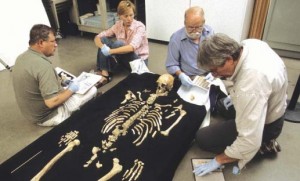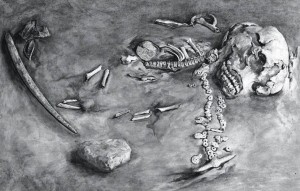With DNA testing, most people think of sci-fi movies, superhero action movies, and other top secret government conspiracies. But they are also ignorant of the possible DNA exploitation of Native Americans in regards to repatriation and heritage.
However, in order to reclaim items, it is desired for Native Americans to allow scientists to take their DNA and match it to the ones on the potential repatriated items. This in itself is wrong. Sure, if I lost something at Vassar, I would probably have to describe it. For a wallet or a backpack, it would be the contents, how much money was in it, what does it look like. But I wouldn’t have to undergo a DNA test to prove my ownership or connection to that particular item.
The same holds true in this case. It is any other item; the Native Americans are being forced to give up something of theirs. And frankly, even though it may not be for something dangerous, it can be misused for other purposes. And with a history of broken promises and being back-stabbed, Native Americans have every reason to decline to genetic testing.
And sure, scientists today can have good intentions. Maybe they’re trying to understand the culture and ancestral ties or maybe even improve the medical field. But this isn’t the way it should be done, deeming your culture and knowledge as superior to another sacred culture. Because no matter how many experiments you can do with the DNA, it will never amount to the price of interfering with a culture and dishonoring a human life.
Unfortunately, this is the way the American legal system works, unyielding and giving, rather than receiving, the burden of proof. This is seen as the easiest and most reliable evidence of today. And it has helped in many cases and, to some extent, it even has expanded our knowledge of the world. But, it has made us inconsiderate and only further ingrains our ignorance. This is just another way of not respecting the sacred, religious ties the Native Americans have to items. We may discover things that were meant to be lost.
Granted, just as some tribes don’t want to be bothered with and don’t want anything to do with repatriation, some tribes do. Some tribes are all for DNA testing, and that’s completely okay. But it should not be assumed that there is a general and genuine consent for all tribes to reclaim every stitch of their culture. Because, again, some culture is made to be left alone, a process they may view as sacred and special.
In short, instead of using DNA testing and then learning about the culture (and possibly offend the tribes), why don’t we take the time to learn whenever possible? Although it’s hard, especially with an infamous history, make a true and genuine effort without any selfish ambitions. What are these festivals? What are these dances? Take a mental note of how certain emblems are used. Then, when it is found, one can made an educated guess based on the culture and not based on personal opinions.

The skeleton of Kennewick man, who, from DNA testing, was confirmed as being Native American. Previously, he could not be repatriated because there was not enough evidence to prove his descent. With this breakthrough, the case may be revisited.
http://static.seattletimes.com/wp-content/uploads/2012/10/2019387270-780×0.jpg
DNA testing helped ties modern day Native tribes from around the world, including Native Americans, to these 24,000 year old skeleton bones. Repatriation of Native cultures, then, doesn’t just affect Natives of America, but all over the world. This is an international issue.
http://images.natureworldnews.com/data/images/full/3886/24-000-year-old-remains-of-malta-boy.jpg?w=600
Readings:
geneticliteracyproject.org/2015/02/02/why-native-ameicans-are-concerned-about-potential-exploitation-of-their-dna/
theatlantic.com/technology/archive/2015/01/the-cultural-limitations-of-genetic-testing/384740
http://www.seattletimes.com/seattle-news/kennewick-man-bones-not-from-columbia-valley-scientist-tells-tribes/
http://www.natureworldnews.com/articles/5002/20131121/native-american-origins-traced-back-to-siberia-using-24-000-year-old-dna-video.htm
Native American DNA: Tribal Belonging and the False Promise of Genetic Science by Kim TallBear


This is a really interesting ethical issue! Do you know if there have been any legal tests regarding the issues you mentioned here? In Australia there’s been DNA analysis of hair samples collected historically by missionaries and others (with all the associated ethical complications), but to date this research has been supported by the Aboriginal people who are the descendants of the sample donors.